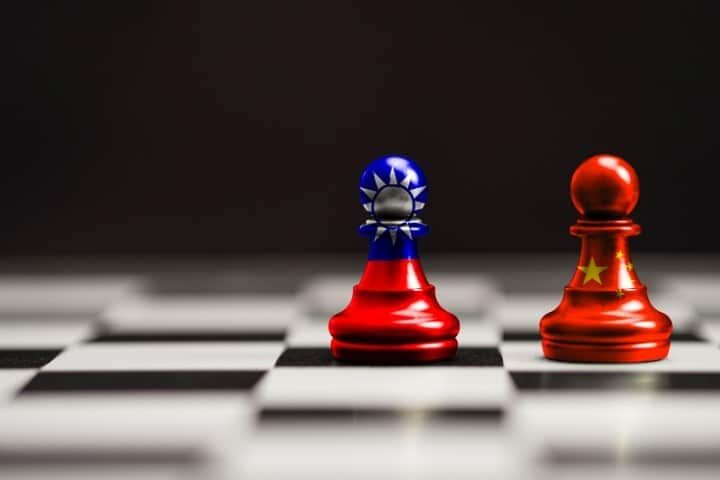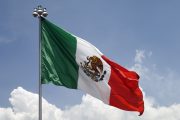
A military clash between the U.S. and China over Taiwan would strike 10.2 percent off global GDP, or roughly $10 trillion, in one year, Bloomberg claimed in a report dated January 9. The business news outlet stated that the upside to its prediction is that all concerned parties are motivated to avert such a conflict.
The Bloomberg Economics team modeled two scenarios: a Chinese incursion drawing the U.S. into a local conflict, and a blockade depriving Taiwan of trade with the rest of the world. Various models were employed to estimate the impact on GDP, considering the blow to semiconductor supply, regional shipping disruptions, trade embargoes and tariffs, and the impact on financial markets. The first scenario would cost the world 5 percent of its yearly GDP, while the second would do more than twice as much damage.
For the main protagonists, other major economies, and the world as a whole, the largest impact would come from Taiwan-made missing semiconductors. Factory lines manufacturing laptops, tablets and smartphones, where Taiwan’s high-end chips are irreplaceable, would cease. Autos and other sectors that use lower-end chips would also be adversely impacted should a war ensue.
Taiwan’s economy is key for the global production of laptops and mobile phones, and to a lesser degree, cars. Besides, the Taiwan Strait is also a major shipping route.
Nonetheless, the Bloomberg estimate for the cost of the war is not the worst-case scenario. If businesses depending on Taiwanese chips underperform in replacing them, global GDP may lose as much as 14 percent, Bloomberg said. That being said, if they perform better than expected, the cost would be lower.
Bloomberg forecasts that in both scenarios, China would take a more severe economic hit than the United States, but “the $10 trillion cost of a crisis would be so high for all players that the incentive to avoid it is strong,” the report said.
Taiwan is a self-governed Chinese island that Beijing considers to be part of the mainland, to be reunited by force, if necessary. The island was the last sanctuary of Kuomintang (KMT) forces fighting the Chinese Communist Party (CCP) during the Chinese civil war that ended in 1949. Taiwan has a security arrangement with the United States, which, although promising to defend the island in case of any conflict, also officially acknowledges Beijing’s “One China” policy.
For its part, Beijing seeks Taiwan’s peaceful reintegration, with Chinese leader Xi Jinping stating during his New Year address that Beijing and Taiwan would “surely be reunified.”
Ongoing skirmishes are part of a global U.S.-Chinese power struggle in which each party slams the other for harboring malign intentions.
Although the odds of an open, armed Sino-U.S. conflict for Taiwan remain low, possibilities are considerable enough for corporations to be hedging their bets, Bloomberg said.
On January 9, Taiwan’s administration published an island-wide alert, reporting a Chinese rocket launch over its airspace.
Phones across Taiwan blared with a “presidential alert” at about 3:15 p.m. local time, around the time Beijing declared the successful launch of its Einstein Probe satellite, which it says will gather astronomical data.
“China launched (a) satellite which flew over the southern airspace,” said the Taiwanese alert in Chinese. “Public, please beware of your safety.”
The English part of the message characterized it as an “air raid alert,” cautioning of a “missile [flying over] Taiwan airspace,” but officials asserted that this was a mistranslation.
Foreign Minister Joseph Wu told reporters that it was a satellite, explaining that the alert was issued due to possible “debris.”
“When a rocket is openly flying in our sky, some of their tubes or debris will fall in this region,” Wu told reporters at a news conference interrupted by the alert. “That’s the reason why our national alert center will issue this kind of alert. It has happened before.”
Mainland media contended that the payload was an astronomical satellite. Earlier, in December 2023, Taiwanese media had also reported Chinese carrier rockets had passed over the island.
The alert came hours after election front-runner Lai Ching-te, Taiwan’s current vice president, lambasted Beijing for employing “all means” to influence this weekend’s poll, which will set the course of cross-strait ties for the next four years.
Lai said that while China meddles in “every election in Taiwan,” the latest efforts are the “most serious.”
“In addition to political and military intimidation, (it is using) economic means, cognitive warfare, disinformation, threats and incentives,” he told reporters.
Lai had previously warned voters to harbor no notions about China maintaining peace, and said that he would not exclude cross-strait exchanges with Beijing if he takes power. “Peace without sovereignty is just like Hong Kong. It is a false peace.”
Touting deterrence as his main defense policy, Lai said the ruling Democratic Progressive Party’s “pursuit of peace relies on strength, not on the goodwill of the aggressor.”
“The goodwill of invaders cannot be relied on — if you look at Tibet and Xinjiang in the past, or Hong Kong today, these are all good examples,” Lai said.
Lai’s opponents include Hou Yu-ih, a former police officer and mayor with the KMT, a party which has long boosted closer cooperation and compromise with China.
Hou has said that Lai — who has previously dubbed himself a “pragmatic worker for Taiwan’s independence” — represents a danger to cross-strait relations.
The world will closely watch Taiwan’s election on January 13 as voters choose a new leader to steer the island in the face of an increasingly pugilistic Beijing.
Beijing has kept a near-daily military presence around Taiwan — with four Chinese balloons moving across the sensitive median line on January 8, the latest in a series of incursions that Taiwan and conflict specialists said was a type of “gray zone” harassment.
Incumbent Taiwanese President Tsai Ing-wen, who is leaving office after reaching the two-term limit, won a landslide victory in the last election in 2020. Under her administration, Beijing has rebuffed all high-level communications and increased political and military pressures against Taiwan.


